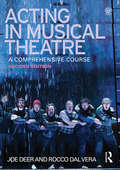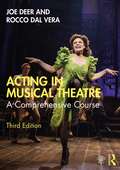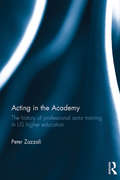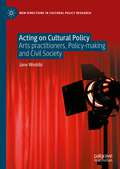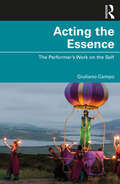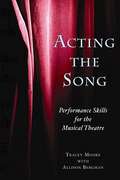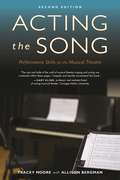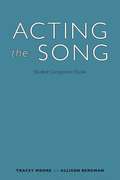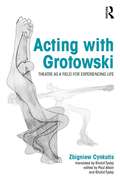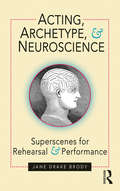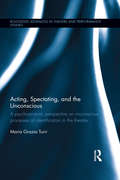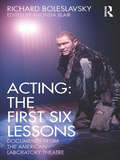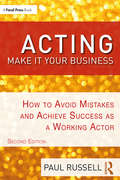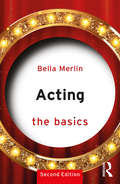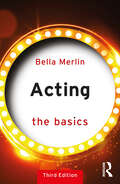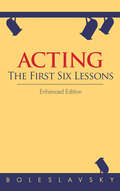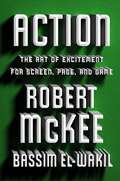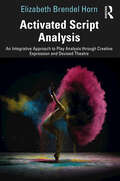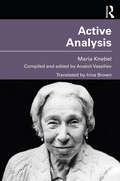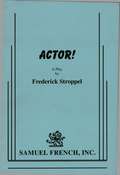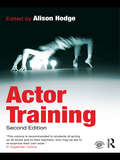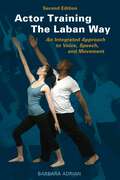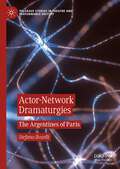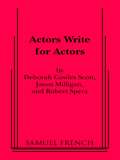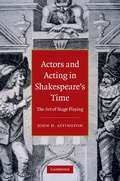- Table View
- List View
Acting in Musical Theatre: A Comprehensive Course
by Joe Deer Rocco Dal VeraActing in Musical Theatre remains the only complete course in approaching a role in a musical. It covers fundamental skills for novice actors, practical insights for professionals, and even tips to help veteran musical performers refine their craft. Updates in this expanded and revised second edition include: A brand new companion website for students and teachers, including Powerpoint lecture slides, sample syllabi, and checklists for projects and exercises. Learning outcomes for each chapter to guide teachers and students through the book’s core ideas and lessons New style overviews for pop and jukebox musicals Extensive updated professional insights from field testing with students, young professionals, and industry showcases Full-colour production images, bringing each chapter to life Acting in Musical Theatre’s chapters divide into easy-to-reference units, each containing group and solo exercises, making it the definitive textbook for students and practitioners alike.
Acting in Musical Theatre: A Comprehensive Course
by Joe Deer Rocco Dal VeraActing in Musical Theatre remains the only complete course in approaching a role in a musical. It covers fundamental skills for novice actors, practical insights for professionals, and even tips to help veteran musical performers refine their craft. Educators will find the clear structure ideal for use with multiple courses and programs. Updates in this expanded and revised third edition include: A comprehensive revision of the book’s companion website into a fully online "Resource Guide" that includes abundant teaching materials and syllabi for a range of short- and long-form courses, PowerPoint slide decks and printable handouts for every chapter. Updated examples, illustrations, and exercises from more recent musical styles and productions such as Hamilton, Waitress, and Dear Evan Hansen. Revision of rehearsal and performance guidelines to help students and teachers at all levels thrive. Updated and expanded reading/listening/viewing lists for specific-subject areas, to guide readers through their own studies and enhance the classroom experience. New notes in the "The Profession" chapters to reflect the latest trends in casting, self-promotion, and audition practice. Acting in Musical Theatre’s chapters divide into easy-to-reference units, each containing group and solo exercises, making it the definitive textbook for students and practitioners alike.
Acting in the Academy: The History of Professional Actor Training in US Higher Education
by Peter ZazzaliThere are over 150 BFA and MFA acting programs in the US today, nearly all of which claim to prepare students for theatre careers. Peter Zazzali contends that the curricula of these courses represent an ethos that is as outdated as it is limited, given today’s shrinking job market for stage actors. Acting in the Academy traces the history of actor training in universities to make the case for a move beyond standard courses in voice and speech, movement, or performance, to develop an entrepreneurial model that motivates and encourages students to create their own employment opportunities. This book answers questions such as: How has the League of Professional Theatre Training Programs shaped actor training in the US? How have training programmes and the acting profession developed in relation to one another? What impact have these developments had on American acting as an art form? Acting in the Academy calls for a reconceptualization of actor training the US, and looks to newly empower students of performance with a fresh, original perspective on their professional development.
Acting on Cultural Policy: Arts Practitioners, Policy-Making and Civil Society (New Directions in Cultural Policy Research)
by Jane WoddisThis book investigates the role of arts practitioners in cultural policy-making, challenging the perception that arts practitioners have little or no involvement in policy and seeking to discover the extent and form of their engagement. Examining the subject through a case-study of playwriting policy in England since 1945, and paying particular attention to playwrights’ organisations and their history of self-directed activity, the book explores practitioners’ participation in cultural policy-making, encompassing both “invited” and “uninvited” interventions that also weave together policy activity and creative practice. It discusses why their involvement matters, and argues that arts practitioners and their organisations can be understood as participants in civil society whose policy activity contributes to the maintenance and enlargement of democratic practices and values.
Acting the Essence: The Performer's Work on the Self
by Giuliano CampoActing the Essence examines the theory, practice, and history of the art of the performer from the perspective of its inner nature as work on oneself, within, around, and beyond the pedagogy of the actor. Ref lecting primarily on the legacy of Jerzy Grotowski, this book is composed of a series of ref lections on the Stanislavskian lineage of practitioners and related authors, in an attempt to revive awareness of the original path traced by the Russian master and to refine certain ambiguities in contemporary training. In a new media age of image and sound, accompanied by a proliferation of new technologies and means to communicate, emphasised by the COVID-19 crisis, a classic question comes to be asked of us again: What is the essence and the principal objective of the work of the performer? Is performing art still necessary? While proposing a theoretical advancement of the discipline and an historical overview of the relevant practices, this book provides tools for a better understanding of the traditional function of the performer’s practice as work on the self, for its ecological renaissance through a conscient use of trance, attention, and altered states of consciousness. This book offers insight for students in drama, theatre, and performance courses studying acting and performance at university.
Acting the Song: Performance Skills for the Musical Theatre
by Tracey Moore Allison BergmanActing the Song offers a contemporary, integrated approach to singing in musicals that results in better-trained, smarter performers who can use song to add drama and dimension to their roles. Directors, teachers of musical theater, and students--including actors, singers, or dancers--will find time-tested advice, exercises and worksheets for all skill levels. This book guides readers through musical theater elements, classroom workshops, and the world of professional auditions and performances. Chapters cover vocal and physical warm-ups, body movement, finding subtext, creating a character, song structure, interpreting text of music and lyrics, risks and spontaneity, memorization, collaboration, keeping a performance fresh, and much more. Both teachers and students will appreciate the sections for beginning, intermediate, and advanced performers. Everyone involved in musical theater, from new students to working professionals, will benefit from this rich resource.
Acting the Song: Performance Skills for the Musical Theatre
by Tracey Moore Allison BergmanActing the Song offers a contemporary, integrated approach to singing in musicals that results in better-trained, smarter performers everyone wants to work with. In this new, thoroughly updated edition of the paperback, directors and teachers of musical theater will find guidance in developing and leading musical theater elements, classroom workshops, and the world of professional auditions and performances. A companion ebook specifically for students-including actors, singers, or dancers-contains time-tested advice, exercises, and worksheets for all skill levels, with links to additional resources online. Subjects for both versions cover:Singing and acting terminologyUse of microphones, recording devices, and other technologyVocal and physical warm-ups, movements, and gesturesCreating a characterFinding subtext, interpreting music and lyrics, and song structureCollaborating with other actorsKeeping a performance fresh and newUsing social media and online audition sitesTeachers and students alike will appreciate the sections for beginning, intermediate, and advanced performers. Covering all changes to the industry, education, music styles, and audition protocols, everyone involved in musical theater, from new students to working professionals, will benefit from this rich resource.Allworth Press, an imprint of Skyhorse Publishing, publishes a broad range of books on the visual and performing arts, with emphasis on the business of art. Our titles cover subjects such as graphic design, theater, branding, fine art, photography, interior design, writing, acting, film, how to start careers, business and legal forms, business practices, and more. While we don't aspire to publish a New York Times bestseller or a national bestseller, we are deeply committed to quality books that help creative professionals succeed and thrive. We often publish in areas overlooked by other publishers and welcome the author whose expertise can help our audience of readers.
Acting the Song: Student Companion Ebook
by Tracey Moore Allison BergmanUsed in tandem with Acting the Song: Performance for the Musical Theatre, this Student Companion Ebook guides students through three semesters (beginning, intermediate, and advanced) of musical theatre song study. It answers the many questions students using this method may have, including some that they may be reluctant to ask-about fear, handling criticism, understanding their type, dealing with bad auditions, and the best use of social media, among others. Worksheets completed by real-life students can be used as models of best practice and will serve to inspire students to dig deeply and explore their own thoughts about the songs.Teachers using Acting the Song will find this ebook companion indispensable, and students will come to class more prepared, ready to work, and more open to learning.
Acting with Grotowski: Theatre as a Field for Experiencing Life
by Zbigniew Cynkutis‘Zbigniew Cynkutis’ writings constitute invaluable testimony of his work with Jerzy Grotowski during the ‘theatre of productions’ phase and beyond. Cynkutis’ insights elucidate aspects of the Laboratory Theatre’s praxis and provide a unique perspective on the questions most often asked about Grotowski. Authored by one of the Laboratory Theatre’s most accomplished actors, this book draws on long-term theatre research and deep knowledge of the craft of acting to offer practical advice indispensable to the professional and aspiring actor alike. The volume offers the English-speaking reader an unprecedented richness of primary source material, which sheds new light on the practical work of one of the most influential theatre directors of the 20th century. Cynkutis’ voice is sincere and direct, and will continue to inspire new generations of theatre practitioners.’ – Dominika Laster, Yale University Acting with Grotowski: Theatre as a Field for Experiencing Life explores the actor-director dynamic through the experience of Zbigniew Cynkutis, one of Polish director Jerzy Grotowski’s foremost collaborators. Cynkutis’s work as an actor, combined with his later work as a director and theatre manager, gave him a visionary overview based on precise embodied understanding. Cynkutis’s writings yield numerous insights into the commitment needed to make innovative, challenging theatre. A central component of Acting with Grotowski is his distinctive approach to training: ‘Conversations with the Body’ includes a range of techniques and approaches to warming up, rehearsing and creating work from a physical starting point, beautifully illustrated by Bill Ireland. The book comprises reflections and practical suggestions on a range of subjects – theatre and culture, improvisation, ethics, group dynamics, and Cynkutis’s vision for the Wrocław Second Studio. It contains visual and textual materials from Cynkutis’s own private archive, such as diary entries and letters. Acting with Grotowski demonstrates the thin line that separates life and art when an artist works with extreme commitment in testing political and social conditions.
Acting, Archetype, and Neuroscience: Superscenes for Rehearsal and Performance
by Jane Drake Brody"How do we move actors into the less accessible regions of themselves and release hotter, more dangerous, and less literal means of approaching a role?" Superscenes are a revolutionary new mode of teaching and rehearsal, allowing the actor to discover and utilize the primal energies underlying dramatic texts. In Acting, Archetype, and Neuroscience Jane Drake Brody draws upon a lifetime’s experience in the theatre, alongside the best insights into pedagogical practice in the field, the work of philosophers and writers who have focused on myth and archetype, and the latest insights of neuroscience. The resulting interdisciplinary, exciting volume works to: Mine the essentials of accepted acting theory while finding ways to access more primally-based human behavior in actors Restore a focus on storytelling that has been lost in the rush to create complex characters with arresting physical and vocal lives Uncover the mythical bones buried within every piece of dramatic writing; the skeletal framework upon which hangs the language and drama of the play itself Focus on the actor’s body as the only place where the conflict inherent in drama can be animated. Acting, Archetype, and Neuroscience weaves together a wealth of seemingly disparate performance methods, exciting actors to imaginatively and playfully take risks they might otherwise avoid. A radical new mixture of theory and practice by a highly respected teacher of acting, this volume is a must-read for students and performance practitioners alike.
Acting, Spectating and the Unconscious: A psychoanalytic perspective on unconscious mechanisms of identification in spectating and acting in the theatre. (Routledge Advances in Theatre & Performance Studies)
by Maria Grazia TurriFrom Aristotle’s theory of tragic katharsis onwards, theorists of the theatre have long engaged with the question of what spectatorship entails. This question has, directly or indirectly, often been extended to the investigation of acting. Acting, Spectating, and the Unconscious approaches the unconscious aspects of spectatorship and acting afresh. Interweaving psychoanalytic descriptions of processes such as transference, unconscious phantasy, and alpha-function with an in-depth survey of theories of spectating and acting from thinkers such as Brecht, Diderot, Rousseau and Plato, Maria Grazia Turri offers a significant insight into the emotions inherent in both the art of the actor, and the spectator’s experience. A compelling investigation of the unconscious communication between spectators and actors, this volume is a must-read for students and scholars fascinated by theatre spectatorship.
Acting: Documents from the American Laboratory Theatre
by Richard Boleslavsky Rhonda BlairActing: The First Six Lessons was first published in 1933 and remains a key text for anyone studying acting today. These dramatic dialogues between teacher and idealistic student explore the field of acting according to one of the original teachers of Stanislavsky’s System in America. <p><p> This new edition of an essential text is edited by Rhonda Blair and supplemented for the very first time with documents from the American Laboratory Theatre. These collect together a broad range of exciting unpublished material, drawn from Boleslavsky’s pivotal and unprecedented teachings on acting at the American Laboratory Theatre.
Acting: How to Avoid Mistakes and Achieve Success as a Working Actor
by Paul RussellIn ACTING: Make It Your Business, Second Edition, award-winning casting director Paul Russell puts the power to land jobs and thrive in any medium—stage, film, television, or the Internet—directly into the hands of the actor. This blunt and practical guide offers a wealth of advice on auditioning, marketing, and networking, combining traditional techniques with those best suited for the digital age. Well-known actors and powerful agents and managers make cameos throughout, offering newcomers and working professionals alike a clear-eyed, uncensored perspective on survival and advancement within the entertainment industry. This second edition has been updated and expanded to include the following: More stars of screen and stage sharing acting career strategies Digital audition techniques for screen and stage, including how best to self-tape New tools to master modern marketing, both digital and traditional with innovation Expanded actor resource listings Additional bicoastal talent agents and managers spilling secrets for obtaining representation, and tips for successful actor-to-representation partnerships New insights on audition techniques An excellent resource for career actors, beginning and amateur actors, as well as students in Acting I and II, Auditions, and Business of Acting courses, ACTING: Make It Your Business provides readers with invaluable tools to build a successful, long-lasting acting career.
Acting: The Basics (The Basics)
by Bella MerlinNow in a vibrantly revised second editon, Acting: The Basics remains a practical and theoretical guide to the world of the professional actor, which skilfully combines ideas from a range of practitioners and linking the academy to the industry. Retaining a balance between acting history, a discussion of pioneers and a consideration of the practicalities of acting techniques, the new edition includes a discussion of acting for the screen as well as the practicalities of stage acting, including training, auditioning and rehearsing. With a glossary of terms and useful website suggestions, this is the ideal introduction for anyone wanting to learn more about the practice and history of acting.
Acting: The Basics (The Basics)
by Bella MerlinActing: The Basics 3rd Edition is a dynamic response to recent societal and entertainment industry changes, focusing on inclusion, diversity and equity, and the actor's trajectory from training to rehearsal to performance on stage and screen, with hands-on tools and global perspectives. The book offers vital ways of building a practical acting toolkit, through breath, body, voice, emotions, imagination and spirit. We begin with a socio-cultural look at actor as magician, storyteller, healer and social changer. Throughout, there are insights from Black, Indigenous, First Nations, South/East Asian, intercultural and feminist practitioners, together with methods focusing on disability and accessibility, intimacy directives, mindfulness and intersectionality. Key 'canonical' figures still feature (e.g., Stanislavsky, Meisner, Brecht and Suzuki) with re-visioned perspective. Scattered throughout are post-COVID insights, plus expanded sections on screen acting (including self-tapes) and Shakespeare. This book is useful for beginner or expert, as it's always helpful getting back to basics. Because the author is both an actor and an actor trainer, the tools are steeped in user-friendly application. At the same time, transferable skills (e.g., dynamic listening and empathy) are shown as relevant to everyone. With a glossary of terms and useful online suggestions (including blogs, videos and podcasts), this is ideal for anyone learn anew about the practice and history of acting, or to take their acting and teaching into new terrain.
Acting: The First Six Lessons
by Richard BoleslavskyThe classic text on the craft of Method acting by the founder of The American Laboratory Theatre.After studying at the Moscow Art Theatre under Konstantin Stanislavski, Richard Boleslavsky became one of the most important acting teachers of his or any generation. Bringing Stanislavski&’s system to America in the 1920s and 30s, he influenced many of the titans of American drama, from his own students—including Lee Strasburg and Stella Adler—to Marlon Brando, Paul Newman, and many others.In Acting: The First Six Lessons, Boleslavsky presents his acting theory and technique in a series of accessible and engaging dialogues. Widely considered a must-have for any serious actor, Boleslavsky&’s work has long helped actors better understand their craft.
Action: The Art of Excitement for Screen, Page, and Game
by Robert McKee Bassim El-WakilFrom the master of Story, Dialogue, and Character, ACTION offers writers the keys to propulsive storytelling. ACTION explores the ways that a modern-day writer can successfully tell an action story that not only stands apart, but wins the war on clichés. Teaming up with the former co-host of The Story Toolkit, Bassim El-Wakil, legendary story lecturer Robert McKee guides writers to award-winning originality by deconstructing the action genre, illuminating the challenges, and, more importantly, demonstrating how to master the demands of plot with surprising beats of innovation and ingenuity.Topics include: Understanding the Four Core Elements of ActionCreating the Action CastHook, Hold, Pay Off: Design in ActionThe Action MacguffinAction Set PiecesThe Sixteen Action SubgenresA must-add to the McKee storytelling library, ACTION illustrates the principles of narrative drive with precision and clarity by referencing the most popular action movies of our time including: Die Hard, The Star Wars Saga, Dark Knight, The Matrix, and Avengers: Endgame.
Activated Script Analysis: An Integrative Approach to Play Analysis through Creative Expression and Devised Theatre
by Elizabeth Brendel HornActivated Script Analysis engages theatre students in traditional formative script analysis through a fusion of devised theatre and various modes of creative expression, dispelling the notion of script analysis as an isolated pen-to-paper task and reimagining it as a captivating and collaborative process. This book uses diverse, contemporary plays to model the script analysis process for each of four Theatrical Elements: Given Circumstances; Character; Setting; and Structure. By considering each of these elements, readers can uncover patterns and themes within a dramatic text. Woven throughout the study of each theatrical element are "Connections": Personal Connections, which encourage readers to explore a theatrical element within their own lives, as though their lives were a script; Play Connections, which make abstract ideas presented in script analysis concrete through theatre-based play; Professional Connections, which examine how a theatre professional might analyze a script within their own work; and Performative Connections, which provide the opportunity for students to explore a theatrical element through performance using devised theatre strategies. At the end of each chapter, readers are given the opportunity to analyze a text through the lens of a Theatrical Element and to express their findings through a variety of digital, written, visual, and performance-based modes of expression. Activated Script Analysis is designed for undergraduate theatre students and educators, to be used as the primary text in Script Analysis coursework or as a supplemental text in Acting or Directing courses. The book includes access to downloadable templates and example videos, available at www.routledge.com/9781032125398.
Active Analysis
by Maria KnebelActive Analysis combines two of Maria Knebel’s most important books, On Active Analysis of the Play and the Role and The Word in the Actor’s Creative Work, in a single edition conceived and edited by one of Knebel's most famous students, the renowned theatre and film director, Anatoli Vassiliev. This is the first English translation of an important and authoritative fragment of the great Stanislavski jigsaw. A landmark publication. This book is an indispensable resource for professional directors, student directors, actors and researchers interested in Stanislavski, directing, rehearsal methods and theatre studies more generally.
Actor
by Frederick StroppelComedy / 3m, 2f / Bare stage with set pieces This comic odyssey charts the life and times of the title character as he makes his way through the show business jungle seeking fame and artistic fulfillment. As a baby he learns that crying brings nourishment and affection; crying too long and loud results in scolds and smacks. Armed with this lesson about the capricious nature of existence, he launches into his craft as a child playing a Wise Man at Christmas. Then it's on to the acting Mecca of New York and acting lessons, a job in children's theatre and the crushing rejection of auditions. He heads to Hollywood and finds success on television and stardom in movies, but his time at the top is fleeting. Throughout, the Actor encounters a bevy of curious characters who influence his journey through this unnatural world.
Actor Training
by Alison HodgeActor Training expands on Alison Hodge's highly-acclaimed and best-selling Twentieth Century Actor Training. This exciting second edition radically updates the original book making it even more valuable for any student of the history and practice of actor training. The bibliography is brought right up to date and many chapters are revised. In addition, eight more practitioners are included - and forty more photographs - to create a stunningly comprehensive study. The practitioners included are: Stella Adler; Eugenio Barba; Augusto Boal; Anne Bogart; Bertolt Brecht; Peter Brook; Michael Chekhov; Joseph Chaikin; Jacques Copeau; Philippe Gaulier; Jerzy Grotowski; Maria Knebel; Jacques Lecoq; Joan Littlewood; Sanford Meisner; Vsevolod Meyerhold; Ariane Mnouchkine; Monika Pagneux; Michel Saint-Denis; Włodzimierz Staniewski; Konstantin Stanislavsky; Lee Strasberg The historical, cultural and political context of each practitioner's work is clearly set out by leading experts and accompanied by an incisive and enlightening analysis of the main principles of their training, practical exercises and key productions. This book is an invaluable introduction to the principles and practice of actor training and its role in shaping modern theatre.
Actor Training the Laban Way (Second Edition): An Integrated Approach to Voice, Speech, and Movement
by Barbara AdrianThe Groundbreaking Actor Training Guide, Enhanced with New Videos and Expert Advice from Acting Professionals Actors, teachers, and students of performing arts: sharpen your skills and release your potential with Actor Training the Laban Way, a groundbreaking approach to physical and vocal movement. Utilizing theories of preeminent movement theorist Rudolf Laban, acting teacher and performer Barbara Adrian integrates voice, speech, and movement training with illustrated individual and group exercises that include: Breath Support Building Dynamic Alignment Expanding Vocal Tone and Range Articulation and Rhythmic Exploration Enhancing Strength and Stamina Improving Balance and Flexibility Developing a Relationship to the Environs Revealing Your Emotional State through Physical and Vocal Action This second edition also includes an all-new chapter of advice from acting professionals on how they deploy these exercises and techniques in their acting preparation, practice, and performance. New appendices offer readers links to video supplements as well as exercises in IPA.Actor Training the Laban Way will make any performer more impulsive, imaginative, and expressive.
Actor-Network Dramaturgies: The Argentines of Paris (Palgrave Studies in Theatre and Performance History)
by Stefano BoselliThis book provides key critical tools to significantly broaden the readers’ perception of theatre and performance history: in line with posthuman thought, each chapter engages Actor-Network Theory and similar theories to reveal a comprehensive range of human and non-human agents whose collaborations impact theatre productions but are often overlooked. The volume also greatly expands the information available in English on the networks created by several Argentine artists. Through a transnational, transatlantic perspective, case studies refer to the lives, theatre companies, staged productions, and visual artworks of a number of artists who left Buenos Aires during the 1960s due to a mix of personal and political reasons. By establishing themselves in the French capital, queer playwright Copi and directors Jorge Lavelli, Alfredo Arias, and Jérôme Savary, among others, became part of the larger group of intellectuals known as “the Argentines of Paris” and dominated the Parisian theatre scene between the 1980s and 90s. Focusing on these Argentine artists and their nomadic peripeteias, the study thus offers a detailed description of the complexity of agencies and assemblages inextricably involved in theatre productions, including larger historical events, everyday objects, sexual orientation, microbes, and even those agents at work well before a production is conceived.
Actors Write for Actors
by Deborah Cowles ScottDramatic and Comedic Monologues \ M and F \ Bare Stage \ The author's of this new monologue collection have all worked as actors - and, more importantly, have spent years auditioning for roles. Actors Write for Actors was written on the premise that the selection of monologues available from published plays is limited and the best pieces are more often than not overdone. Deborah Cowles Scott, Jason Milligan and Robert Spera have created fresh material to add to the existing body of audition pieces available to the actor. Most of these audition monologues were written for the Actors Theatre of Louisville's Apprentice Company and have been used by some of the country's top actors. This book is a must for every actor's library.
Actors and Acting in Shakespeare's Time
by John H. AstingtonJohn Astington brings the acting style of the Shakespearean period to life, describing and analysing the art of the player in the English professional theatre between Richard Tarlton and Thomas Betterton. The book pays close attention to the cultural context of stage playing, the critical language used about it, and the kinds of training and professional practice employed in the theatre at various times over the course of roughly one hundred years - 1558-1660. Perfect for courses, this 2010 survey takes into account recent discoveries about actors and their social networks, about apprenticeship and company affiliations, and about playing outside the major centre of theatre, London. Astington considers the educational tradition of playing, in schools, universities, legal inns, and choral communities, in comparison to the work of the professional players. A comprehensive biographical dictionary of all major professional players of the Shakespearean period is included as a handy reference guide.
